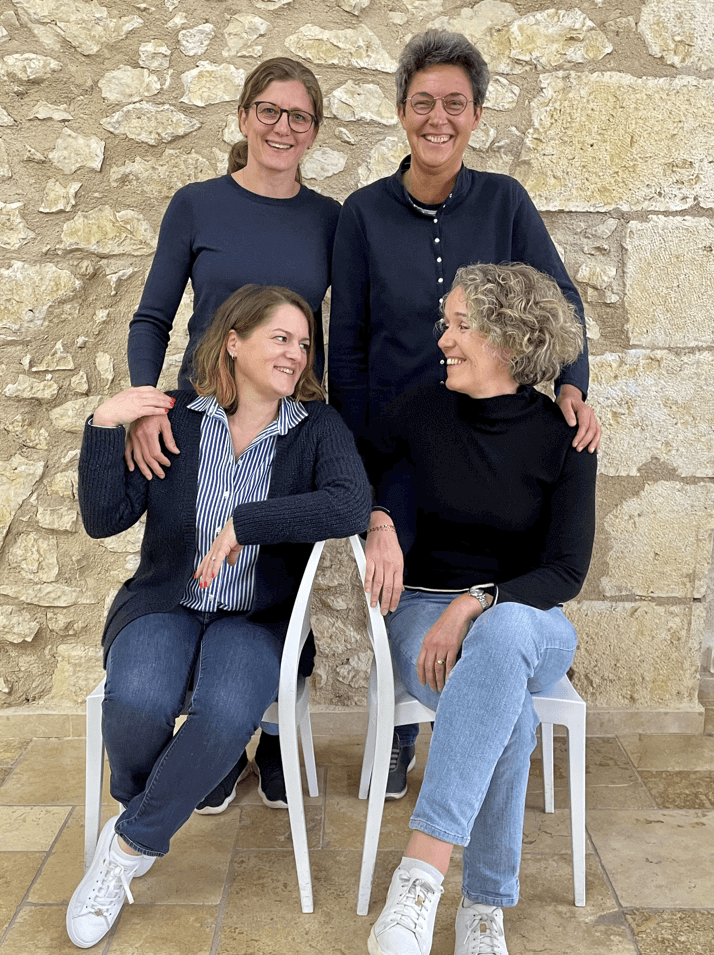
Airbus, an INR’s member since 2019, is resolutely committed to a Sustainable IT approach. This also involves parity within the Airbus IT department. The floor is given to Catherine Jestin, Celia Frey, Sandra Collomb and Karine Dehaese, members of the IT department’s leadership team, who share with us their actions in favour of parity, for a more inclusive, ethical and responsible digital world.
- Please, can you confirm the parity rate (around 40%) in the leadership team of the Airbus IT department ? How do you explain it ? [Catherine]
Absolutely. My leadership team comprises 4 women out of a total of 10 members. So 40% is the right number. More generally we have 23% women in the IT department and 26% of our IT senior managers are female. These numbers are the result of Airbus’ strong commitment to diversity as well as my own conviction of the potential and advantages of working with diverse teams, whether it is in terms of gender, nationality, academic background, etc. I believe that diverse and inclusive teams are stronger and more creative, they are better at decision making as well as problem solving and overall perform better.
- How did the Airbus IT department take up the subject to achieve this result? [Sandra]
To achieve this result we not only consider recruitment activities for current open positions and ensure our short lists contain suitable female candidates, we also actively contribute to growing a pipeline of women, by identifying and promoting role models as well as supporting and leveraging initiatives to increase diversity.
- Is this result of the IT department part of a broader approach within Airbus? [Catherine]
For many years, Airbus has been a responsible company and has taken its commitment to promoting an inclusive and safe workplace seriously, ensuring a sustainable impact on our society, and we continue to reaffirm this. Regarding gender balance, we are signatories to several official commitments, Sustainable Development Goals (SDGs), women empowerment principles, etc. in which we at Airbus have reiterated our commitment to promote a more inclusive environment regarding gender diversity and inclusion within our company. Today, 33% of the Board of Directors, 25% of the Executive committee are already women, females make up 14% of our executive population and 16% of our senior managers.
Airbus has also set itself the goal of 33% of new recruits being women on a yearly basis. To do this, we need to remain an attractive employer, the employer of choice for female talent right from entry level, through to middle and senior management levels. We have put in place specific
leadership development programmes, for young women, we are doing mentoring, we have a network in place across all divisions.
- Does the fact that Airbus has committed to a nationally and internationally recognised Sustainable IT approach, help you to increase female representation in your workforce? [Sandra]
I strongly believe that Sustainability is a topic that provides purpose to all of us regardless of gender. Having a sustainable vision and ambition for the future of aviation is undoubtedly a factor that attracts individuals from all backgrounds and is therefore an enabler for more diverse teams.
- In your opinion, what are the dynamics in organisations that we still need to fight against to achieve parity? [Karine]
Unconscious bias, cultural beliefs and stereotypes, leaders of organisations have, in the past, had a tendency to unconsciously recruit people like them, resulting in a less diverse workforce. At Airbus, a mandatory “Unconscious Bias” training module was rolled out for all employees in 2021 in order to break down these social stereotypes formed outside of an individual’s conscious awareness. In addition, Airbus has internally agreed to a gender diversity ambition to increase female representation at executive levels of the Company, and is actively creating a robust pipeline including specific leadership programs for women. Externally, Airbus has put a number of
outreach activities in place especially for young school girls, through mentorship and tutorships. Examples include “Capital Filles” and “Elles Bougent” associations. I had the opportunity tomentor some students at school and university sharing my career path: I enjoyed seeing little stars in their eyes.
- Why are women so poorly represented in tech in France or in Europe? How can we encourage women to join tech teams? [Célia]
This is a very complex question which is the topic of quite a number of articles and research. So, I have to stay humble, I do not have the complete answer but rather some thoughts. I believe that it’s a combination of different factors, on the one hand girls continue to be underrepresented in STEM subjects at school and on the other there are too few tech women role models and “celebrities” to demonstrate that these tech careers are accessible.
At Airbus we invite female high school students to visit our facilities and meet our female employees / role models to talk about their experience and understand how we can engage and inspire them to choose a career in the aeronautical industry, example is “Elles du Futur” in France. We also participate in career fairs and conferences promoting women in aeronautics and breaking gender stereotypes, and we sponsor a number of external associations: Elles Bougent (FR), Feminisons les métiers de l’aero – Airemploi, (FR) Capital Filles (FR), WISE & WES (Women’s Engineering Society) (UK), IAWA International Conference, Everywoman (UK), Alta (UK), WIA (GE and FR), We are the Future in Tech (with Unesco)
